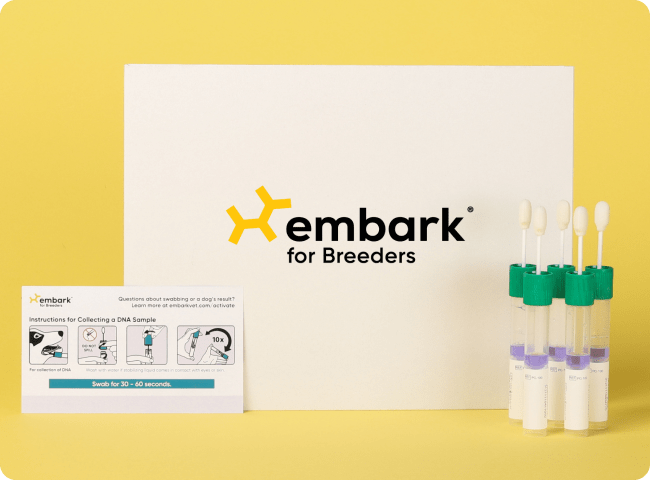Pomsky
Fun Fact
Over the past 10 to 20 years, the demand for designer dogs has been on the rise. Pomskies have become popular among people who want a small dog, but not a traditional Pomeranian or Siberian Husky.
-
About Pomskies
The Pomsky is a designer dog that is a mix between a Pomeranian and Siberian Husky. These adorable dogs are bred for their tendency to look puppy-like as adults. Currently, there aren’t many Pomsky breeders, making them rare and very expensive — from $2,000 to $5,000. Pomskies are a newer type of designer dog, and there isn’t a lot of data to predict what physical and temperamental traits they’ll inherit from each parent. They are more suited for families with older children or adults, and generally do well with apartment living. -
Physical characteristics
The physical traits of Pomskies can vary greatly depending on what DNA they get from each of their parents. Pomeranians are small dogs and Huskies are large dogs. Pomskies tend to be small to medium-sized dogs. Pomsky size can range from 10 to 15 inches tall at the top of the shoulder blade and 13 to 18 inches long. They usually weigh between 20 and 30 pounds but can be as small as 7 pounds. Pomskies come in a range of colors and patterns. The most desired and expensive Pomskies are as small as a Pomeranian with the color patterns and blue eyes of a Husky. Most people want a Pomsky that will always look like a Husky puppy. However, there’s no way to know exactly how large a Pomsky will grow to be when they’re a puppy. -
Nutrition
Pup parents should always provide their dog with a "balanced and complete" diet. The Association of American Feed Control Officials (AAFCO) sets standards for optimum pet nutrition. The first thing to look for when buying dog food is something showing that it’s AAFCO approved. A manufacturer cannot put “balanced and complete” on the packaging unless it’s AAFCO approved. Pomskies should be fed a high-quality diet. Fresh water should be offered each day in a clean bowl. Pomskies also need carbohydrates and some healthy fats to meet their energy needs. A high-quality diet will also contain essential vitamins and minerals. Pet parents should consult with a veterinarian or canine nutritionist to make sure they’re providing the best diet for their Pomsky. -
Grooming
Pomskies require a lot of grooming. They have double coats that are soft to silky and fluffy. Pomskies are very heavy shedders and should be brushed at least once a week with a brush specific to their coat’s needs. Pomskies “blow their coat” twice a year in a process that lasts about three months. During this time, they lose their undercoat in chunks and should be brushed daily. Their teeth should also be brushed regularly and their claws trimmed every few weeks. They are likely to need advanced dental care with their veterinarian in their middle-age to older years. -
Playtime and training
Training for Pomskies should begin on day one. Pomskies are highly intelligent and will need to see their pup parent as the alpha for training to be successful. They respond very well to reward-based training and positive reinforcement. Pomskies can be stubborn and willful. They don’t respond well to negative reinforcement. Pomskies have a lot of energy and should get a lot of play time. They love walks, frolicking, and playing with toys. They should be given at least an hour of playtime each day. Destructive behavior is a common problem when a Pomsky hasn’t been given enough playtime. For your safety and theirs, dogs should be exposed to potty training, crate training, riding in the car, greeting people appropriately, having their feet, ears, and muzzle touched, and be comfortable with being left alone at home for short periods. Some dogs may need special care regarding loud noises such as thunderstorms and fireworks or introduction to children and other animals. -
Health and aging in the Pomsky breed
Because the Pomsky became popular so recently, we’re still learning about their health and lifepan. A Pomsky's average life expectancy is likely 13 to 15 years. This is an estimate based on the average lifespan of Pomeranians and Huskies. An Embark Dog DNA Test looks at the following health conditions in Pomskies: Did you know?
75% of dogs are either at risk for or a carrier of a genetic disease. Embark Dog DNA Tests screen for 250+ genetic health risks so you can give your Pomsky the proactive care they deserve. -
Health Conditions
Learn about your dog's genetic breed ancestry with Embark
Dog owners
Breed identification, health and trait insights, personalized care recommendations, and the world’s first canine relative finder—all in one leading dog DNA test.
Learn about the report for dog ownersShop the test
Breeding programs
Embark’s test for breeding programs is one comprehensive DNA test designed with your needs in mind.
Learn about the report for breedersShop the test

